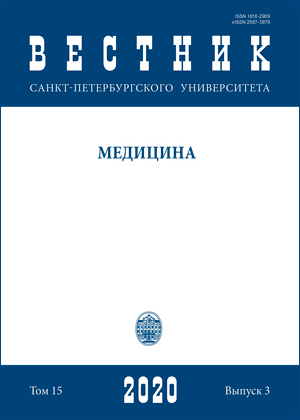Quality of life and muscle strength improvement in an amyotrophic lateral sclerosis patient after nutraceuticals*
DOI:
https://doi.org/10.21638/spbu11.2020.308Abstract
The objective of the article was to describe a patient with amyotrophic lateral sclerosis (ALS) treated with nutraceuticals who had a better quality of life and improved muscle strength. A 65-year-old male patient with a past medical history of gout was diagnosed with amyotrophic lateral sclerosis in 2016. He received intravenous immunoglobulin and prednisone, but no improvement was observed. In 2018, he was diagnosed with multiple myeloma, submitted to a bone marrow transplant, and initiated riluzole. After 2 months, he came to our private clinic; he could not walk anymore and used outpatient nasal ventilator equipment. Beck anxiety inventory (BAI) was 20 [normal range (nr): < 8], Beck depression inventory (BDI) was 12 (nr: < 10), Bristol stool form scale (BSTS) was 5 (nr: 3–4), and there were 7 symptoms of dysbiosis. Analogic visual scale (Lickert scale) for well-being was 5.0. We suspended the colchicine, added vitamin D3, creatine, vitamin C, N-acetyl cysteine, 5-hydroxytryptamine, B1, and B6 vitamins. Dysbiosis was also treated. After 2 months, he returned feeling much better, BAI and BDI reduced BDI to 11, and BSFS normalized. Following this evaluation, a nutraceutical prescription was added: methylfolate, zinc, magnesium, green tea extract, Ginkgo biloba, lipoic acid, pyrroloquinoline quinone, vitamin E, coenzyme Q10, and resveratrol. After 7 months, he was feeling very well; BAI and BDI were normal, he gained weight. He felt a marked improvement in his muscle strength, and he gained again the capacity of eating alone, his quality of life improved, and AVS well-being was 8.0. This report illustrates a demonstrative case of a patient with ALS treated with nutraceuticals and improved his quality of life and muscle strength. It may be an alternative therapeutic option for such patients.
Keywords:
amyotrophic lateral sclerosis, neurological disorders, lower neuron disease, immunity, vitamin D, nutraceuticals, supplements
Downloads
References
References
Downloads
Published
How to Cite
Issue
Section
License
Articles of "Vestnik of Saint Petersburg University. Medicine" are open access distributed under the terms of the License Agreement with Saint Petersburg State University, which permits to the authors unrestricted distribution and self-archiving free of charge.




